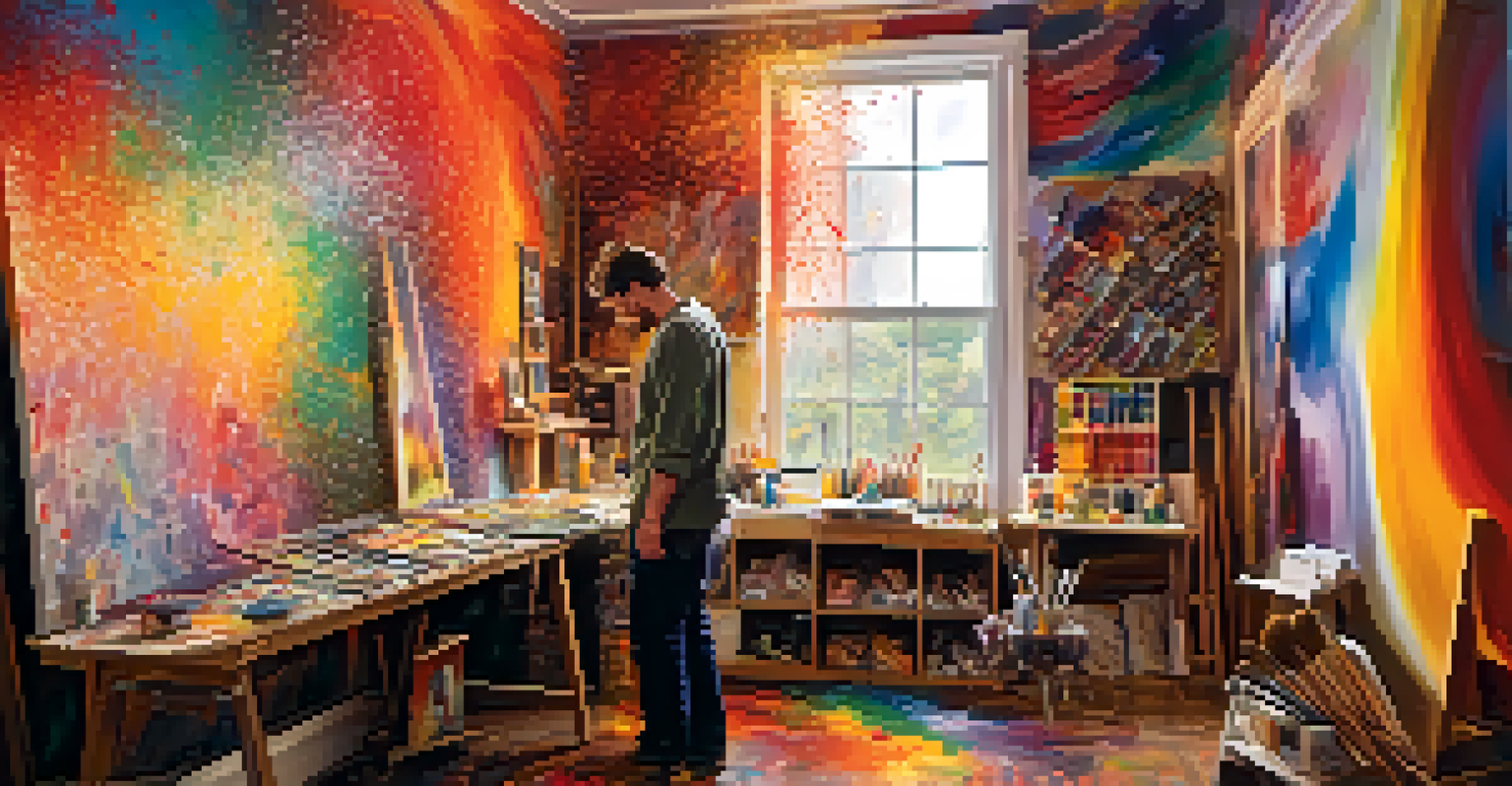LSD and the Art of Storytelling: Personal Narratives Unfolded

The Intersection of LSD and Creativity in Storytelling
LSD, or lysergic acid diethylamide, has long been associated with creativity and expanded consciousness. Many artists, writers, and musicians have claimed that psychedelics can unlock new avenues of thought and expression. This unique cognitive shift often leads to deeper emotional insights, which can enrich storytelling.
Psychedelics can allow us to break through the barriers of our mind, revealing the interconnectedness of all things and deepening our understanding of ourselves and the world around us.
Think of LSD as a key that unlocks doors in the mind, allowing a storyteller to access memories and emotions that might otherwise remain hidden. These experiences can transform ordinary narratives into extraordinary journeys, filled with vivid imagery and profound meaning. For instance, a simple childhood memory might evolve into a fantastical adventure when viewed through the lens of an altered state of consciousness.
As we explore the blend of LSD and storytelling, it’s essential to recognize that these experiences are deeply personal. Each individual’s journey can vary greatly, leading to unique narratives that reflect their thoughts, feelings, and perceptions influenced by the psychedelic experience.
Personal Narratives: The Heart of Storytelling
At the core of every great story is a personal narrative, a tale that resonates on a human level. These narratives allow us to connect with others, sharing our experiences, struggles, and triumphs. They serve as a mirror, reflecting our inner worlds and inviting others to step into our shoes.

When combined with LSD, these personal narratives can take on new dimensions, revealing layers of meaning that might not be apparent in a sober state. This can lead to a cathartic experience, where the storyteller not only shares their story but also discovers new aspects of themselves. For instance, a writer may find that their fears or regrets surface, allowing them to confront and articulate these emotions in a powerful way.
LSD Enhances Creative Storytelling
The use of LSD can unlock new cognitive pathways, enriching narratives with deeper emotional insights and vivid imagery.
Ultimately, personal narratives are the backbone of storytelling, and LSD can amplify their emotional depth. By exploring our own stories while under the influence, we may uncover hidden truths that enhance our narratives, making them more relatable and impactful.
LSD's Role in Enhancing Emotional Expression
One of the most significant effects of LSD is its ability to heighten emotional responses, leading to richer storytelling. This heightened sensitivity can allow storytellers to tap into feelings that resonate deeply with their audience. Emotions are the lifeblood of any narrative, and LSD can help articulate these feelings in an authentic manner.
The creative process is a journey into the unknown, and psychedelics can serve as a guide, helping us navigate the labyrinth of our thoughts and emotions.
Imagine a painter who, under the influence of LSD, suddenly sees colors and emotions in a new light. Similarly, a storyteller can experience a profound connection to their narrative, enabling them to convey emotions with more clarity and intensity. This transformation can make a story not just heard but felt, creating a lasting impact on the listener.
However, it’s important to approach this heightened emotional expression with care. While LSD can enhance storytelling, it can also lead to overwhelming feelings. Striking the right balance is crucial to ensure that the story remains coherent and impactful without becoming too chaotic.
Navigating the Challenges of Psychedelic Storytelling
While the fusion of LSD and storytelling can yield beautiful narratives, it’s not without its challenges. The altered state of consciousness can sometimes lead to confusion or fragmented thoughts, making it difficult to convey a coherent story. This unpredictability can be both a gift and a hurdle for storytellers.
Consider the metaphor of a winding river; while it may lead to breathtaking views, the twists and turns can complicate navigation. Similarly, LSD can provide profound insights, but those insights may become tangled in a web of thoughts that are hard to communicate. For many, this might require additional time and reflection to distill their experiences into a cohesive narrative.
Personal Narratives Gain Depth
When combined with LSD, personal stories can reveal hidden truths and emotions, enhancing their relatability and impact.
Recognizing these challenges can help storytellers prepare for the journey ahead. Embracing the messiness of the creative process, while also allowing for moments of clarity, can lead to stories that are not only unique but also resonate with authenticity.
The Influence of Cultural Context on Psychedelic Narratives
Cultural context plays a pivotal role in shaping how stories are told and understood. Different cultures have varying perspectives on psychedelics like LSD, influencing how personal narratives unfold. In some societies, psychedelics are revered as tools for spiritual growth, while in others, they may be stigmatized or misunderstood.
When storytellers incorporate LSD into their narratives, they bring their cultural backgrounds into the mix. This can enrich the storytelling experience, allowing listeners to gain insight into different worldviews. For example, an artist from a culture that embraces psychedelics may tell a story that reflects communal experiences and traditions, creating a bridge between the individual and the collective.
Understanding the cultural nuances surrounding LSD can help audiences appreciate the deeper meanings behind psychedelic narratives. It allows for a richer dialogue about the intersection of personal experiences and cultural identity, ultimately enhancing the storytelling process.
Exploring the Therapeutic Potential of LSD in Storytelling
Beyond creativity, LSD has shown promise in therapeutic settings, particularly in how it can aid in storytelling. The act of sharing one’s story can be a powerful tool for healing, and LSD may provide the emotional access necessary for this process. This therapeutic potential can transform personal narratives into avenues for growth and understanding.
For individuals grappling with trauma or unresolved emotions, storytelling under the influence of LSD can facilitate breakthroughs. By confronting and articulating these experiences, storytellers may find a sense of closure or clarity that was previously elusive. This form of narrative therapy can be incredibly liberating, allowing for the release of pent-up feelings.
Cultural Context Shapes Experiences
The way LSD is perceived in different cultures influences storytelling, adding layers of meaning and understanding to personal narratives.
However, it’s essential to approach this therapeutic aspect with caution and respect. LSD should only be explored in safe, supportive environments, ideally with guidance from professionals who understand both the substance and the storytelling process.
The Future of LSD, Storytelling, and Personal Narratives
As society continues to explore the potential benefits of psychedelics, the intersection of LSD and storytelling is likely to evolve. With growing interest in mental health and creative expression, more artists and writers may turn to psychedelics for inspiration. This could lead to a new wave of narratives that reflect the complexities of the human experience.
Imagine a future where storytelling becomes a collaborative journey, blending traditional narratives with psychedelic experiences. Such a shift could foster deeper connections among storytellers and their audiences, creating a community that celebrates vulnerability and authenticity. It might also encourage discussions about the ethical use of psychedelics in creative settings.

Ultimately, the future of LSD and storytelling holds exciting possibilities. As we continue to learn about the potential of psychedelics, we may discover new ways to share our personal narratives, making them more relatable, profound, and transformative.